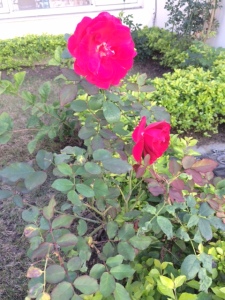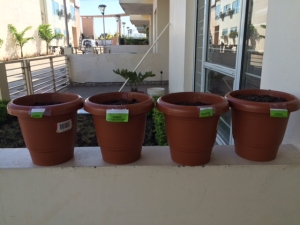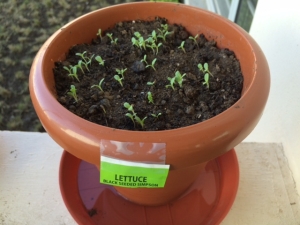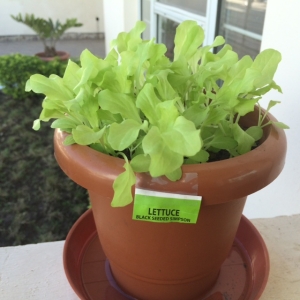Winter nights might get cold in Bhopal, but that doesn’t stop the roses from blooming. There were roses everywhere when we arrived in December, except in our own little front yard whose four rosebushes had just been deadheaded and were not ready to produce fresh blooms on demand. One of them flowered feebly soon after my husband left, and I sent him a picture of “his” rose. On the other three bushes, not a single bud appeared. They all looked like they could use some fertilizer.

I tried to be patient. I asked the colony’s gardener to bring me some potting soil and planted the lettuce and herb seeds I had brought from Michigan. There’s happiness to be found in growing plants from seed, but it does take time. Raanu observed this process with great interest. Once the seeds had sprouted, I asked Vijay to carry several of the pots to the upstairs terrace, where they would get better light.

And every day, some days more than once, we were driving past Rajiv Rosery at Lalghati, until I couldn’t stand it anymore and asked Vijay to stop so I could buy at least one flowering rose bush. Rajiv’s is a wonderful nursery and they have many other plants. My husband wanted a curry-leaf tree, also known as meetha neem, and I picked up a potted specimen about two feet tall. For myself I selected a pink “desi” rose. Not as spectacular to look at as some of the others, but with a heady fragrance. When Raanu arrived the next day, she exclaimed, “Auntie, have your flowers grown this much already?”

Raanu loves to talk and, even more, to ask questions. She is very intelligent but has only a fifth-grade education. Her husband, she tells me, has completed grade twelve and knows a little English. He works as a security guard. They have two little boys. Sometimes she’s a little late for work, but she always has an excuse. One day she said it was because she’d had a fight with her husband that morning. Recalling something my sister-in-law had said about the plight of women married to alcoholics, I asked, “Does your husband drink?”
“Oh, he has a drink now and then, but not too much. That was not the reason. It’s just his nature, he’s the quarreling type.”
Then I remembered. A few days earlier she had asked me if I knew where Mandla was. I had never heard of the place; somewhere near Jabalpur, she said. She told me that she had come from Mandla to Bhopal after a fight with her mother-in-law.
“She and you didn’t get along?” I jumped to conclusions.
“I got along with her,” she replied, “ It’s my husband who quarreled with his mother. Then he and I and his one brother moved here, and the other brother stayed with her.”
Now, each time she’s late I tease her, “Had a fight with your pati-dev?” and she giggles. Marital spats are a fact of life and when a couple never fights, it means that one of the spouses (or worse, both) has stopped caring, according to one of those all-knowing FaceBook posters.
Along came Valentine’s Day. I had flowers delivered to my family in Michigan, and my husband bested me by sending roses and a chocolate cake (thus establishing his reputation as an incurable romantic). The next morning Raanu gaped at the picture-perfect, but scentless, roses in admiration.
“Did you buy those?”
“No, Raanu, Sir sent them.”
“From America?”
“Yes, all the way from America.”
“Valentine’s Day, huh?” she grinned.
Valentine’s Day is notorious in India because each year some Hindu extremists threaten to (and sometimes actually do) beat up any unmarried couples they find hanging out in public on that day, or drag them to the nearest temple and have them married on the spot. A Bhopali cartoonist created a hilarious wordplay on the local pronunciation of the “holiday” by calling it “Bailan taang deyn” (“Let’s hang up the rolling pin”), illustrated with a drawing of an irate woman, wielding that globally recognized weapon of housewives.
By the end of the week, most of the flowers had wilted. I threw them in the trash, keeping only the ones that were still somewhat perky. Raanu was shocked.
“Auntie! Your flowers are in the trash! Did you do that?”
“Yes, they were dead or dying.”
“You mean they were not plastic?”
I burst out laughing.
“Raanu, did you think they were artificial?”
Now she was also laughing.
“They were so pretty!” she said.
“But not anymore…”

Meanwhile, some of the seedlings have grown into something recognizable as a head of lettuce, at least to someone who has seen those things before. Raanu recognizes only the spinach.
“Why do you grow that? You can get it in the market.”
“I know, but it’s fun to grow your own.”
“And that, how do you cook that?”
“It’s for salad, you eat it raw.”
She looks at me to see if I’m pulling her leg.
“I thought you were growing flowers,” she says.
“There are flowers, too!” I point at the zinnias, “But they take a little longer.”
“What will happen to them when you go back to America? Or will you stay here to take care of your plants?”
“My friends and family will take care of them while I’m gone.”
“Until you come back?”
“Yes.”
“But you will come back, won’t you, Auntie?”
“I will definitely come back.”
“Good. I will have to find someone else to work for while you’re gone. But I’ll come back, too.”
Sometimes I think my life here is just a tad too perfect to be real, like those roses, but then I decide to enjoy it while it lasts.
23.254481
77.413027




